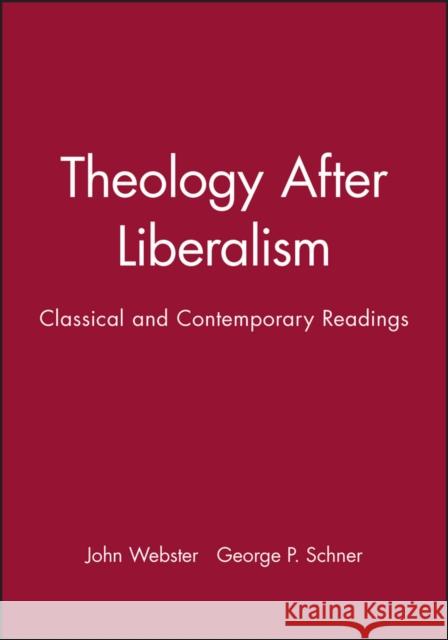Theology After Liberalism » książka



Theology After Liberalism
ISBN-13: 9780631205647 / Angielski / Miękka / 2000 / 412 str.
Theology After Liberalism
ISBN-13: 9780631205647 / Angielski / Miękka / 2000 / 412 str.
(netto: 228,18 VAT: 5%)
Najniższa cena z 30 dni: 239,10
ok. 30 dni roboczych.
Darmowa dostawa!
This reader brings together texts which articulate or debate with the mode of theology most commonly identified as 'post-liberal'.
"Having grown out of classroom use for postgraduate students, the good introductory material make this reader quite appropriate as a taster for final–year undergraduates. A collection like this serves a useful function in helping students discover a good range of contemporary material in a short time."
International Journal of Systematic Theology <!––end––>
"These readings do a good job of acquainting the reader with the major characteristics of postliberalism and the ferment it has sparked. I recommend it to those seeking to understand these contemporary developments in theology." The Southern Baptist Journal of Theology
"The editors have done a wonderful job of selecting and organizing the pieces which, taken together, provide an excellent introduction to an important project." Toronto Journal of Theology
List of Contributors.
Preface.
Acknowledgements.
Part I Introduction.
Metaphors for Theology (George P. Schner).
Theology after Liberalism (John Webster).
Part II Doctrines.
Identity Description and Jesus Christ (Hans Frei).
The Triune God: The Perichoresis of Particular Persons (William Placher).
The Atonement and the Triune God (Colin Gunton).
Freedom and Reality (Oliver O Donovan).
Theology in Dialogue (J. Augustine DiNoia).
Part III Methods.
Beyond the Hermeneutical Deadlock (James J. Buckley).
Tradition and the Tacit (Andrew Louth).
Self–Critical Cultures and Divine Transcendence (Kathryn Tanner).
Depth of Self–Awareness and Breadth of Vision: Joining Reflection and Interpretation (Frans Jozef van Beeck).
Part IV Criticisms.
Feminist Theology: Language, Gender and Power (Mary McClintock Fulkerson).
Postmodern Theology and the Judgement of the World (Rowan Williams).
The Uneasy Alliance Reconceived: Catholic Theological Method, Modernity and Postmodernity (David Tracy).
Part V Afterword.
Toward a Postliberal Theology (George A. Lindeck).
Index
John Webster is Lady Margaret Professor of Divinity at the University of Oxford. Previously he was Ramsay Armitage Professor of Systematic Theology at Wycliffe College, University of Toronto. His previous books include
Barth′s Moral Theology (1997),
Barth′s Ethics of Reconciliation (1995),
The Possibilities of Theology (1994), and
Eberhard Jungel (1986).
George Schner teaches at Regis College, Toronto. His previous publications include Education for Ministry (1993), and two edited works, Ignatian Spirituality in a Secular Age (1984) and The Church Renewed (1986); he is currently preparing a book on the philosophical foundations of the search for the historical Jesus.
This
Reader brings together texts which articulate or debate with the mode of theology most commonly identified as "post–liberal". It provides an introduction to this major contemporary theological option for students of systematic theology.
The wide sampling of theological writing represented here seeks to move beyond the dominant conventions of modern theology, by retrieving aspects of the classical Christian tradition and exploring its potential for creative and constructive theology in the modern context.
The volume, introduced by two substantial editorial essays, is divided into three sections. First, there are readings which treat major doctrinal areas as they have been handled by ′post–liberal′ theologians. Second, there are readings which treat issues of the methods, norms and sources of theology. Third, there are critiques of ′post–liberal′ theology from a variety of perspectives. Each reading is introduced and contextualized by the editors.
Part one of the volume introduces the book with two substantial editorial essays. Part two contains readings which treat major doctrinal areas as they have been handled by ′postliberal′ theologians. The readings in part three treat issues of the methods, norms and sources of theology. Part four comprises critiques of ′postliberial′ theology from a variety of perspectives. The volume′s Afterword concludes with the profoundly influential work of George A Lindbeck, which did so much to stimulate debate. Each reading is introduced and contextualized by the editors.
1997-2026 DolnySlask.com Agencja Internetowa
KrainaKsiazek.PL - Księgarnia Internetowa









